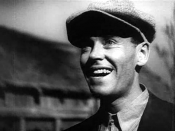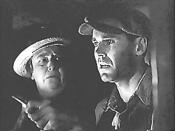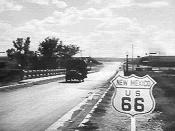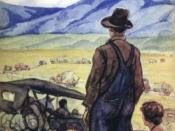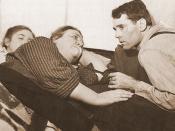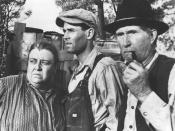No simple definition can describe religion, however, with the many affiliations between Steinbeck's Grapes of Wrath and the Bible, one can easily envision what it entails. When first beginning my journey with the Grapes of Wrath, I merely embraced it for its literal meaning. I soon realized that doing so limited my ability to understand it at the intellectual level it called for. Changing my unfit ways, the story promptly took a new turn, for I was awestricken at its author's clever ability of interfacing biblical ideas and concepts. Now, tailing alongside the Joad's journey was surprisingly only half the battle, for with the story's consistent uniting with the Bible, one could only be drawn deeper into this epic of the ordinary, struggling to preserve their humanity.
Jim Casy, a former preacher and martyr of his own beliefs, can easily prove his Jesus-like role in the Grapes of Wrath. On an observable note, Jim Casy's initials, J.C., directly correspond with those of Jesus Christ's. As well as his name, Casy's actions directly correlate with Jesus' doings in the many parables of the Bible, the most obvious of these being their personalities and sacrificial beliefs. With Jesus' amenable death for us on the cross, we see that he died in hopes of leaving us faith, whether in him, ourselves, or one another. Likewise, we soon observe Casy's sacrifice to the story when he takes Tom's (a former friend and member of the Joad family) place as the scapegoat for a crime he committed. Upon doing so, he not only safeguarded his confidant, but fulfilled his ongoing role as spiritual martyr. "Between his guards Casy sat proudly, his head up and his neck prominent. On his lips there was a faint smile and on his face a curious look of conquest (Steinbeck 343)." Just as Jesus was satisfied to die a tormenting death for his people, Casy was ecstatic with his idea of putting another before himself, and ultimately, sacrificing his life for those he cared about most.
" "ÃÂListen,' he said. "ÃÂYou fellas don' know what you're doin'. You're helpin' to starve kids.'"æ Casy went on, "ÃÂYou don' know what you're a-doin'.' The heavy man swung with a pick handle"æ The heavy club crashed into the side of his head with a dull crunch of bone"æ (495)" Merely trying to speak the true word, his neighborly attitude lead fatal. Lastly, Casy's leave of absence (his containment in prison) and stunning return (before his death), greatly symbolize the crucifixion and resurrection of Christ. Because Casy hadn't fulfilled his duty in the mere beginning, his miraculous return was made solely to complete what wasn't finished.
Though Tom Joad seems to have no religious affiliations throughout the novel, there is a devout connection between him and the spiritual Casy. A disciple is considered to be one of the twelve in the inner circle of Christ's followers, their purpose being to accept and assist in spreading the doctrines of Him. Having this said, I definitely believe that Tom unconsciously acquired the role of Casy's disciple. Not only was Tom one of twelve Joads, but seeing Casy upon his phenomenal return, Tom began to secure a new respect and belief in him. Allowing Casy a genuine opportunity to show his true colors, Tom was moved by Casy's ideas and propositions. Casy believed that the nation faced a nearly unconquerable enemy. His first thoughts being that the devil was our worst enemy, but soon realizing that people were facing a more powerful force. Understanding Casy's point of view, Tom vowed to continue his purpose and fight for better treatment of workers like himself.
" "ÃÂMa, I'll do what Casy done"æ I been thinkin' a hell of a lot, thinkin' about our people livin' like pigs an' the good rich lan' layin' fallow, or maybe one fella with a million acres, while a hundred thousan' good farmers is starvin'"æ Well, maybe like Casy says, a fella ain't got a soul of his own but on'y a piece of a big one"ÃÂan' then"ÃÂ"ÃÂ(536). " The fact that Tom told his mother this as well as further ambitions, shows that he is rather serious about fulfilling these duties. He has surely taken to heart what Casy said and is planning on making a marked difference.
Turning to a more broad sense, there are many occurrences in Grapes of Wrath that directly link to events in the Bible. The entire book's main purpose and its struggle with industrialization directly correspond to the well-known evil force, the devil. Continuing on, the Joads, along with many other mid- and southwestern families, began their journey to California in search of hope and opportunity. In turn, the journey of free Jewish people to the Promise Land was just as brutal and emotional. Having the story deepen, there was a flash flood and following, a major complication with Rose of Sharon's (a pregnant Joad family member) newborn baby. As disaster had it, Rose of Sharon gave birth to a stillborn baby which was then placed down the river to be washed away, out of the Joad's complicated lives. Referring back to the Bible, the notable Moses traveled the exact journey, however dissimilar, for he was found alive and healthy. With the randomness of these Bible references, you're never assured what to expect next.
Nearing the end of this tragic story, we are left with extended memories of sacrifice. Reiterating an occurrence in the story, Rose of Sharon gave birth to a still born baby, leaving her feeling worthless for killing the one life she was once in control of. For nine months, all Rose of Sharon ever knew were the hardships and grievances of bearing a child. When the occasion finally arrived for her to claim the life she had been living for, nothing drew near. Pure devastation was all that filled the poor girl's soul, for not only had she been living as a burden to her supportive family, but an invert to their continual progress.
" She looked at Rose of Sharon huddled in the comfort. Ma's eyes passed Rose of Sharon's eyes, and then came back to them. And the two women looked deep into each other. The girl's breath came short and gasping.
She said, "ÃÂYes.' (580)." Rebounding from her agonizing experience moments before, Rose of Sharon takes advantage of an incredible opportunity. Noticing a starving man in the corner, Rose of Sharon agrees to and proceeds to expose her breast and feed him. What's extraordinary about the situation is not only her amazing sacrifice, but the brief moment of time that Rose of Sharon and her mother experience before it. It was a mother-daughter moment when the two were for the first time seeing eye to eye and the same truths.
Finding Steinbeck as genius as he is, it is rather difficult to discover and thoroughly understand his every sentiment. As already mentioned, there are ample occasions throughout the book that add to my understanding of him, however it is almost impossible to say that I have completely rationalized his every thought. From my discernment, I find Steinbeck quite sympathetic yet realistic of the beliefs of organized religion rather than the idea of personal mysticism. Not only is his portrayal of organized religion depicted through his most significant characters, but his entire story reflects strong Christian faith. Taking the story for its literal value, you would disregard much of Steinbeck's reason for the Grapes of Wrath, but it's seeing into it further that provides you with the true reason for its existence.
Realizing the true role that religion played in Steinbeck's Grapes of Wrath, I don't believe it would be comparatively as sensational without it. Being religious myself, I was able to put the story in a perspective that allowed me the understanding of it to its fullest. It held my interest throughout and demanded me to expect the most of myself as well as my religion. The story has not only made me expand my horizons, but open my eyes to the phenomena's of writing, and given me a criteria in which I can compare other stories in the future. I will never forget the portrait of the bitter conflict between the powerful and the powerless that this book has painted, for it greatly probes into the very nature of equality and justices in American society.
